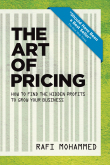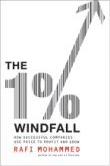What's Your Little Cash Cow?
Randall Stross wrote an interesting article on the price of text messaging in the New York Times on December 28. In the last three years, text message prices have doubled from 10 cents to 20 cents amidst astronomical growth. The Gartner Group estimates that 2.5 trillion messages were sent in 2008, which is up 32 percent from 2007. Curious as to why prices doubled during this strong growth (this is indeed an anomaly as prices generally decrease when popularity increases), the Chairman of the Senate Antitrust committee sent letters to several wireless carriers inviting them to discuss their costs and pricing. Mr. Stross writes that it really does not cost very much to provide text messaging services, so cost is not the reason for the price hikes.
What really interested me about this story – there’s no type of collusion or antitrust activity going on between cellular phones companies – is how such a non-differentiated competitive service like text messaging could be so profitable. A text message is a text message, there’s nothing unique about one service over another. However, when you think about it, there are similar non-differentiated competitive products that are cash cows in other industries. For instance, we’ve all heard that it literally costs pennies for the fountain soda that you get at fast food restaurants. If the costs are so cheap and the product is non-differentiated (Coke or Pepsi), why do fast food restaurants make so much money off their drinks? My local burger joint charges $1.29 for a 16 ounce fountain drink (which is half ice)…there’s a lot of margin in that drink. Why doesn’t a fast food chain trumpet “Low cost fountain drinks. 50 cents a fountain drink!” Tell me, if a rival burger chain offered half priced sodas, would that change your loyalty? Similarly, why doesn’t a hotel chain advertise, “The cashews in our mini-bar are cheap?” Or how about a grocery chain that markets, “Our impulse purchase products that are located right by the cash register are cheaper than at other supermarkets.” Because, quite frankly, very few customers would care.
Consumers make their purchases based on the differentiated value of the primary product they are seeking. I selected my cellular carrier because it has great service in major cities. I like my burgers flame broiled. I stay at my favorite hotel chain because I’ve had great experiences with the rooms and services in the past. Discount prices on text messaging, fountain Coca-Cola drinks, or cashews aren’t going to change my mind. My point is that customers come for your flagship products and less so for the undifferentiated complementary products that your store also sells. As a result, most highly differentiated products also have ancillary cash cow products that they can sell at high markups.
So what’s your little cash cow product or service? I bet you have one.





It seems to me that per message pricing is only a small part of the whole picture. More and more carriers where I live are offering one fixed monthly price for phone and text. It seems to me it's more like hospital pricing: The group participants (high users) pay a lower price and the uninsured participant (low user) pays inordinately high prices.